| Listing 1 - 10 of 27 | << page >> |
Sort by
|
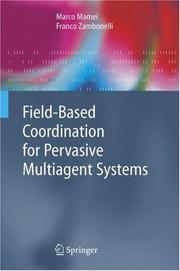
ISBN: 1280608676 9786610608676 3540279695 3540279687 3642066232 Year: 2006 Publisher: Berlin, Heidelberg : Springer Berlin Heidelberg : Imprint: Springer,
Abstract | Keywords | Export | Availability | Bookmark
 Loading...
Loading...Choose an application
- Reference Manager
- EndNote
- RefWorks (Direct export to RefWorks)
More and more, software systems involve autonomous and distributed software components that have to execute and interact in open and dynamic environments, such as in pervasive, autonomous, and mobile applications. The requirements with respect to dynamics, openness, scalability, and decentralization call for new approaches to software design and development, capable of supporting spontaneous configuration, tolerating partial failures, or arranging adaptive reorganization of the whole system. Inspired by the behaviour of complex natural systems, scientists and engineers have started to adjust their mechanisms and techniques for self-organization and adaption to changing environments. In line with these considerations, Mamei and Zambonelli propose an interaction model inspired by the way masses and particles in our universe move and self-organize according to contextual information represented by gravitational and electromagnetic fields. The key idea is to have the components’ actions driven by computational force fields, generated by the components themselves or by some infrastructures, and propagated across the environment. Together with its supporting middleware infrastructure – available with additional information under http://www.agentgroup.unimore.it – this model can serve as the basis for a general purpose and widely applicable approach for the design and development of adaptive distributed applications.
Evolutionary programming (Computer science) --- Adaptive computing systems --- Distributed artificial intelligence. --- Embedded computer systems --- Design. --- Programming. --- DAI (Artificial intelligence) --- Distributed AI (Artificial intelligence) --- Artificial intelligence --- Adaptive computing --- Configurable computing systems --- Reconfigurable computing systems --- Computer systems --- Computer programming --- Information Technology --- Artificial Intelligence --- Artificial intelligence. --- Computer Communication Networks. --- Software engineering. --- Artificial Intelligence. --- Software Engineering. --- Computer software engineering --- Engineering --- AI (Artificial intelligence) --- Artificial thinking --- Electronic brains --- Intellectronics --- Intelligence, Artificial --- Intelligent machines --- Machine intelligence --- Thinking, Artificial --- Bionics --- Cognitive science --- Digital computer simulation --- Electronic data processing --- Logic machines --- Machine theory --- Self-organizing systems --- Simulation methods --- Fifth generation computers --- Neural computers --- Computer communication systems. --- Communication systems, Computer --- Computer communication systems --- Data networks, Computer --- ECNs (Electronic communication networks) --- Electronic communication networks --- Networks, Computer --- Teleprocessing networks --- Data transmission systems --- Digital communications --- Electronic systems --- Information networks --- Telecommunication --- Cyberinfrastructure --- Network computers --- Distributed processing
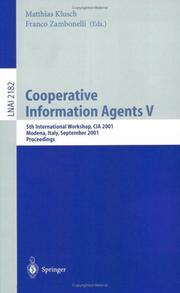
ISBN: 3540425454 3540447997 9783540425458 Year: 2001 Volume: 2182 Publisher: New York, NY ; Berlin : Springer-Verlag,
Abstract | Keywords | Export | Availability | Bookmark
 Loading...
Loading...Choose an application
- Reference Manager
- EndNote
- RefWorks (Direct export to RefWorks)
These are the proceedings of the Fifth International Workshop on Cooperative Information Agents, held in Modena, Italy, September 6-8, 2001. Information agent technology has become one of the major key technologies for the Internet and the World Wide Web. It mainly emerged as a response to the challenges of cyberspace from both the technological and human user perspective. Development of information agents requires expertise from di?erent research disciplines such as Arti?cial Intelligence (AI), advanced databases and knowledge base systems, distributed information systems, information retrieval, and Human Computer Interaction (HCI). The ?fth international workshop on Cooperative Information Agents (CIA) continued the tradition by capturing the intrinsic interdisciplinary nature of the above research area by calling for contributions from di?erent research communities, and by promoting open and informative discussions on all related topics. In keeping with tradition, the workshop featured a sequence of regular and invited talks of excellence given by leading experts in the ?eld. This year the topics of the talks are mainly on the challenges of information agents in the upcoming age of ubiquitous and pervasive computing. These challenges are in particular due to the necessity of an e?cient utilization, evolution, and trust management of information agents for user-oriented information search, pro- sion, and visualization in networked computing environments with small, mobile, and embedded devices. A di?erent issue concerns the potential of agent-based support of massive distributed data warehousing worldwide.
Intelligent agents (Computer software) --- Internet --- Computer Science --- Engineering & Applied Sciences --- Computer science. --- Computer communication systems. --- Database management. --- Information storage and retrieval. --- Artificial intelligence. --- Electrical engineering. --- Computer Science. --- Artificial Intelligence (incl. Robotics). --- Database Management. --- Communications Engineering, Networks. --- Information Storage and Retrieval. --- Computer Communication Networks. --- Information Systems Applications (incl. Internet). --- Electric engineering --- Engineering --- AI (Artificial intelligence) --- Artificial thinking --- Electronic brains --- Intellectronics --- Intelligence, Artificial --- Intelligent machines --- Machine intelligence --- Thinking, Artificial --- Bionics --- Cognitive science --- Digital computer simulation --- Electronic data processing --- Logic machines --- Machine theory --- Self-organizing systems --- Simulation methods --- Fifth generation computers --- Neural computers --- Data base management --- Data services (Database management) --- Database management services --- DBMS (Computer science) --- Generalized data management systems --- Services, Database management --- Systems, Database management --- Systems, Generalized database management --- Communication systems, Computer --- Computer communication systems --- Data networks, Computer --- ECNs (Electronic communication networks) --- Electronic communication networks --- Networks, Computer --- Teleprocessing networks --- Data transmission systems --- Digital communications --- Electronic systems --- Information networks --- Telecommunication --- Cyberinfrastructure --- Network computers --- Informatics --- Science --- Distributed processing --- Telecommunication. --- Information storage and retrieva. --- Artificial Intelligence. --- Electric communication --- Mass communication --- Telecom --- Telecommunication industry --- Telecommunications --- Communication --- Information theory --- Telecommuting --- Information storage and retrieval systems. --- Automatic data storage --- Automatic information retrieval --- Automation in documentation --- Computer-based information systems --- Data processing systems --- Data storage and retrieval systems --- Discovery systems, Information --- Information discovery systems --- Information processing systems --- Information retrieval systems --- Machine data storage and retrieval --- Mechanized information storage and retrieval systems --- Computer systems --- Electronic information resources --- Data libraries --- Digital libraries --- Information organization --- Information retrieval --- Application software. --- Application computer programs --- Application computer software --- Applications software --- Apps (Computer software) --- Computer software --- Intelligent agents (Computer software) - Congresses --- Internet - Congresses
Digital
ISBN: 9783540279693 Year: 2006 Publisher: Berlin, Heidelberg Springer-Verlag Berlin Heidelberg
Abstract | Keywords | Export | Availability | Bookmark
 Loading...
Loading...Choose an application
- Reference Manager
- EndNote
- RefWorks (Direct export to RefWorks)
Digital
ISBN: 9783540709459 Year: 2007 Publisher: Berlin, Heidelberg Springer-Verlag Berlin Heidelberg
Abstract | Keywords | Export | Availability | Bookmark
 Loading...
Loading...Choose an application
- Reference Manager
- EndNote
- RefWorks (Direct export to RefWorks)
Computer science --- Programming --- Computer architecture. Operating systems --- Artificial intelligence. Robotics. Simulation. Graphics --- Computer. Automation --- programmeren (informatica) --- programmeertalen --- software engineering --- KI (kunstmatige intelligentie) --- computernetwerken --- robots
Digital
ISBN: 9783540340997 Year: 2006 Publisher: Berlin Heidelberg Springer-Verlag GmbH
Abstract | Keywords | Export | Availability | Bookmark
 Loading...
Loading...Choose an application
- Reference Manager
- EndNote
- RefWorks (Direct export to RefWorks)
Computer science --- Programming --- Computer architecture. Operating systems --- Artificial intelligence. Robotics. Simulation. Graphics --- Computer. Automation --- programmeren (informatica) --- programmeertalen --- software engineering --- KI (kunstmatige intelligentie) --- computernetwerken --- robots
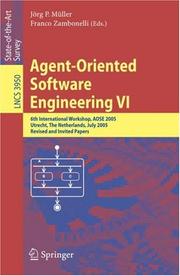
ISBN: 9783540340973 3540340971 3540340998 Year: 2006 Publisher: Berlin, Heidelberg : Springer Berlin Heidelberg : Imprint: Springer,
Abstract | Keywords | Export | Availability | Bookmark
 Loading...
Loading...Choose an application
- Reference Manager
- EndNote
- RefWorks (Direct export to RefWorks)
Agent and multiagent concepts offer higher level abstractions and mechanisms which address issues such as knowledge representation and reasoning, communication, coordination, cooperation among heterogeneous and autonomous parties, perception, commitments, goals, beliefs, and intentions all of which need conceptual modeling. The AOSE 2005 workshop sought to examine the credentials of agent-based approaches as a software engineering paradigm, and to gain an insight into what agent-oriented software engineering will look like, and what its benefits will be. This book represents the thoroughly refereed post-proceedings of the 6th International Workshop on Agent-Oriented Software Engineering, AOSE 2005, held in Utrecht, The Netherlands, in July 2005 as part of AAMAS 2005. The 18 revised full papers were carefully selected from 35 submissions during two rounds of reviewing and improvement. The papers are organized in topical sections on modeling tools, analysis and validation tools, multiagent systems design, implementation tools, and experiences and comparative evaluations.
Software engineering --- Intelligent agents (Computer software) --- Génie logiciel --- Agents intelligents (Logiciels) --- Congresses. --- Congrès --- Computer Science --- Engineering & Applied Sciences --- Information Technology --- Software Engineering --- Computer science. --- Computer communication systems. --- Software engineering. --- Computer programming. --- Computer logic. --- Artificial intelligence. --- Computer Science. --- Software Engineering/Programming and Operating Systems. --- Software Engineering. --- Artificial Intelligence (incl. Robotics). --- Logics and Meanings of Programs. --- Programming Techniques. --- Computer Communication Networks. --- AI (Artificial intelligence) --- Artificial thinking --- Electronic brains --- Intellectronics --- Intelligence, Artificial --- Intelligent machines --- Machine intelligence --- Thinking, Artificial --- Bionics --- Cognitive science --- Digital computer simulation --- Electronic data processing --- Logic machines --- Machine theory --- Self-organizing systems --- Simulation methods --- Fifth generation computers --- Neural computers --- Computer science logic --- Logic, Symbolic and mathematical --- Computers --- Electronic computer programming --- Electronic digital computers --- Programming (Electronic computers) --- Coding theory --- Computer software engineering --- Engineering --- Communication systems, Computer --- Computer communication systems --- Data networks, Computer --- ECNs (Electronic communication networks) --- Electronic communication networks --- Networks, Computer --- Teleprocessing networks --- Data transmission systems --- Digital communications --- Electronic systems --- Information networks --- Telecommunication --- Cyberinfrastructure --- Network computers --- Informatics --- Science --- Programming --- Distributed processing --- Logic design. --- Artificial Intelligence. --- Design, Logic --- Design of logic systems --- Digital electronics --- Electronic circuit design --- Logic circuits --- Switching theory
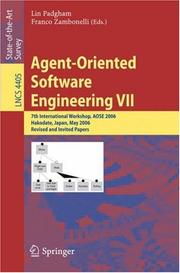
ISBN: 9783540709442 3540709444 9786610969371 1280969377 3540709452 Year: 2007 Publisher: Berlin ; Heidelberg : Springer-Verlag,
Abstract | Keywords | Export | Availability | Bookmark
 Loading...
Loading...Choose an application
- Reference Manager
- EndNote
- RefWorks (Direct export to RefWorks)
Software architectures that contain many dynamically interacting components, each with their own thread of control, and engaging in complex coordination protocols, are difficult to correctly and efficiently engineer. Agent-oriented modelling techniques are important for supporting the design and development of such applications. This book provides a diverse and interesting overview of the work that is currently being undertaken by a growing number of researchers and research groups in the area of Agent-Oriented Software Engineering. The papers present leading edge research in this field, which is of critical importance in facilitating industry take-up of powerful agent technologies. This volume constitutes the thoroughly refereed post-proceedings of the 7th International Workshop on Agent-Oriented Software Engineering, AOSE 2006, held in Hakodate, Japan, in May 2006 as part of AAMAS 2006. The 13 revised full papers were carefully selected from numerous submissions during two rounds of reviewing and improvement and have been complemented by invited papers from leading researchers in the field. The papers are organized in topical sections on modelling and design of agent systems, modelling open agent systems, formal reasoning about designs, as well as testing, debugging and evolvability.
Software engineering --- Intelligent agents (Computer software) --- Génie logiciel --- Agents intelligents (Logiciels) --- Congresses. --- Congrès --- Intelligent agents (Computer software) -- Congresses. --- Software engineering -- Congresses. --- Computer Science --- Engineering & Applied Sciences --- Information Technology --- Software Engineering --- Computer science. --- Computer communication systems. --- Software engineering. --- Computer programming. --- Computer logic. --- Artificial intelligence. --- Computer Science. --- Software Engineering/Programming and Operating Systems. --- Software Engineering. --- Artificial Intelligence (incl. Robotics). --- Logics and Meanings of Programs. --- Programming Techniques. --- Computer Communication Networks. --- AI (Artificial intelligence) --- Artificial thinking --- Electronic brains --- Intellectronics --- Intelligence, Artificial --- Intelligent machines --- Machine intelligence --- Thinking, Artificial --- Bionics --- Cognitive science --- Digital computer simulation --- Electronic data processing --- Logic machines --- Machine theory --- Self-organizing systems --- Simulation methods --- Fifth generation computers --- Neural computers --- Computer science logic --- Logic, Symbolic and mathematical --- Computers --- Electronic computer programming --- Electronic digital computers --- Programming (Electronic computers) --- Coding theory --- Computer software engineering --- Engineering --- Communication systems, Computer --- Computer communication systems --- Data networks, Computer --- ECNs (Electronic communication networks) --- Electronic communication networks --- Networks, Computer --- Teleprocessing networks --- Data transmission systems --- Digital communications --- Electronic systems --- Information networks --- Telecommunication --- Cyberinfrastructure --- Network computers --- Informatics --- Science --- Programming --- Distributed processing --- Logic design. --- Artificial Intelligence. --- Design, Logic --- Design of logic systems --- Digital electronics --- Electronic circuit design --- Logic circuits --- Switching theory
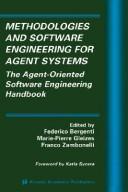
ISBN: 1280625368 9786610625369 1402080581 1402080573 9781402080579 9781402080586 Year: 2004 Publisher: New York : Kluwer Academic Publishers,
Abstract | Keywords | Export | Availability | Bookmark
 Loading...
Loading...Choose an application
- Reference Manager
- EndNote
- RefWorks (Direct export to RefWorks)
As information technologies become increasingly distributed and accessible to larger number of people and as commercial and government organizations are challenged to scale their applications and services to larger market shares, while reducing costs, there is demand for software methodologies and appli- tions to provide the following features: Richer application end-to-end functionality; Reduction of human involvement in the design and deployment of the software; Flexibility of software behaviour; and Reuse and composition of existing software applications and systems in novel or adaptive ways. When designing new distributed software systems, the above broad requi- ments and their translation into implementations are typically addressed by partial complementarities and overlapping technologies and this situation gives rise to significant software engineering challenges. Some of the challenges that may arise are: determining the components that the distributed applications should contain, organizing the application components, and determining the assumptions that one needs to make in order to implement distributed scalable and flexible applications, etc.
Software engineering. --- Intelligent agents (Computer software) --- Artificial intelligence. --- Computer science. --- Artificial Intelligence. --- Software Engineering/Programming and Operating Systems. --- Programming Languages, Compilers, Interpreters. --- Programming languages (Electronic computers). --- Computer languages --- Computer program languages --- Computer programming languages --- Machine language --- Electronic data processing --- Languages, Artificial --- Computer software engineering --- Engineering --- AI (Artificial intelligence) --- Artificial thinking --- Electronic brains --- Intellectronics --- Intelligence, Artificial --- Intelligent machines --- Machine intelligence --- Thinking, Artificial --- Bionics --- Cognitive science --- Digital computer simulation --- Logic machines --- Machine theory --- Self-organizing systems --- Simulation methods --- Fifth generation computers --- Neural computers --- Software engineering --- 681.3*D2 --- 681.3*D2 Software engineering: protection mechanisms; standards--See also {681.3*K63}; {681.3*K51} --- Software engineering: protection mechanisms; standards--See also {681.3*K63}; {681.3*K51} --- Agents, Autonomous (Computer software) --- Agents, Cognitive (Computer software) --- Agents, Intelligent (Computer software) --- Assistants, Cognitive (Computer software) --- Assistants, Intelligent software --- Autonomous agents (Computer software) --- Cognitive agents (Computer software) --- Cognitive assistants (Computer software) --- IAs (Computer software) --- Intelligent agent software --- Intelligent software agents --- Intelligent software assistants --- Software agents (Computer software) --- Special agents (Computer software) --- Artificial intelligence --- Computer programs
Book
ISBN: 9783540279693 Year: 2006 Publisher: Berlin Heidelberg Springer Berlin Heidelberg
Abstract | Keywords | Export | Availability | Bookmark
 Loading...
Loading...Choose an application
- Reference Manager
- EndNote
- RefWorks (Direct export to RefWorks)
More and more, software systems involve autonomous and distributed software components that have to execute and interact in open and dynamic environments, such as in pervasive, autonomous, and mobile applications. The requirements with respect to dynamics, openness, scalability, and decentralization call for new approaches to software design and development, capable of supporting spontaneous configuration, tolerating partial failures, or arranging adaptive reorganization of the whole system. Inspired by the behaviour of complex natural systems, scientists and engineers have started to adjust their mechanisms and techniques for self-organization and adaption to changing environments. In line with these considerations, Mamei and Zambonelli propose an interaction model inspired by the way masses and particles in our universe move and self-organize according to contextual information represented by gravitational and electromagnetic fields. The key idea is to have the components' actions driven by computational force fields, generated by the components themselves or by some infrastructures, and propagated across the environment. Together with its supporting middleware infrastructure - available with additional information under http://www.agentgroup.unimore.it - this model can serve as the basis for a general purpose and widely applicable approach for the design and development of adaptive distributed applications.
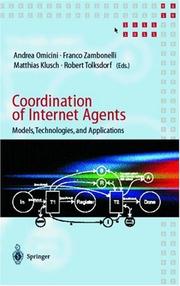
ISBN: 3540416137 9783540416135 Year: 2001 Publisher: Berlin New York Springer
Abstract | Keywords | Export | Availability | Bookmark
 Loading...
Loading...Choose an application
- Reference Manager
- EndNote
- RefWorks (Direct export to RefWorks)
Internet --- Intelligent agents (Computer software) --- DARPA Internet --- Internet (Computer network) --- Wide area networks (Computer networks) --- World Wide Web --- Agents, Autonomous (Computer software) --- Agents, Cognitive (Computer software) --- Agents, Intelligent (Computer software) --- Assistants, Cognitive (Computer software) --- Assistants, Intelligent software --- Autonomous agents (Computer software) --- Cognitive agents (Computer software) --- Cognitive assistants (Computer software) --- IAs (Computer software) --- Intelligent agent software --- Intelligent software agents --- Intelligent software assistants --- Software agents (Computer software) --- Special agents (Computer software) --- Artificial intelligence --- Computer programs
| Listing 1 - 10 of 27 | << page >> |
Sort by
|

 Search
Search Feedback
Feedback About
About Help
Help News
News